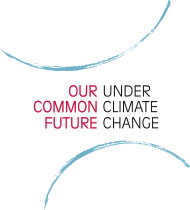Our Common Future Under Climate Change
International Scientific Conference 7-10 JULY 2015 Paris, France
- Home
- Side Events
- 151 The role of international financial institutions, central banks, and monetary policies in the low carbon transition
THE ROLE OF INTERNATIONAL FINANCIAL INSTITUTIONS, CENTRAL BANKS, AND MONETARY POLICIES IN THE LOW CARBON TRANSITION
Overview
Organizers : Centre International de Recherche sur l'Environnement et le D´┐Żveloppement, Nogent sur Marne, France; France Strat´┐Żgie, Paris, France; UNEP, London, United Kingdom
Date : July 7th, from 2pm to 6pm
Location : France Strat´┐Żgie, Paris, France (exact timing tbc)
Expected number of participants : 1-50
Nature of participants : scientists, finance professionals, decision-makers
Keywords : Finance, central banks, monetary policy, low-carbon transition
Keynote speakers : TBD
Summary
Given the tight budgetary constraints on governments, public spending alone will not be sufficient to provide the amount of investment needed to reach a 2´┐ŻC target. There is a need to a) cut down the risks level on low carbon investments, b) shift private financial flows from ´┐Żbrown´┐Ż sectors to ´┐Żgreen´┐Ż sectors c) leverage new sources of financing including the savings currently not directed to production and infrastructures.
High enough and credible carbon prices will be essential to do so. But, it will not be enough to alleviate the financial constraints that inhibit investment decisions. These constraints result from the intrinsic risks of low-carbon investments in capital-intensive equipment and infrastructure in a shareholder business regime (uncertainty about upfront costs, final markets, fossil fuel prices and about the regulatory context of the infrastructure sectors).
Upgrading climate finance can only be achieved if the low carbon transition is perceived by policy makers as a driver to reduce some of the fault lines threatening today's world economy: from an "export to grow" model to a more "inclusive" growth system; from a short-term biased financial system to devices bridging long-term investment needs with short-term savings objectives; from unstable reserve currencies to a diversification through carbon assets, ...
Participants
The side-event will convene about 30 to 50 experts for an open discussion about the possible involvement of central banks and institutions of the international financial governance in the low-carbon transition. The targeted audience is both experts of the ´┐Żclimate affair´┐Ż and experts in Finance and Monetary Policies, representatives of banks, central banks and financial institutions:
Experts involved in the policy process : Klaus T´┐Żpfer, Pascal Canfin, Teresa Ribera
Academics in environmental economics, macroeconomics and finance: Nick Mabey (E3G), Jorge Nunes, Michel Aglietta, Billy Pizer or Gilbert Meltcalf, Etienne Espagne, Baptiste Perissin Fabert, Christian Egenhofer, Michael Grubb, Alex Barkawi (CEP), Richard Werner (Southampton), Adair Turner (Institute for New Economic Thinking), Cornelius Block (Ecofys), Carlo Carraro, Zhang Chenghui (Financial Research Institute, China)
Experts from the international organisations: Wickram Widge (World Bank), Richard Baron (OECD), Nick Robins (UNEP), Christopher Kaminker (OECD), Anthony Cox (OECD), Ian Parry (IMF), Marianne Fay (World Bank)
Experts and representatives from financial institutions: Marc Carney (Bank of England), Habib Rahman (Deputy General Manager, Bangladesh Bank), Wim Boonstra (Rabobank) Pan Gongsheng or Ma Jun or Yao Bin (People´┐Żs Bank of China), Michael Sheren/Marc Carney (Bank of England), Atiur Rahman (Governor, Bangladesh Bank), Mario Sergio Vasconcelas, (Brazilian Banking Association), Aloisio Tupinamb´┐Ż ( Governor´┐Żs Office for Regulation, Brazil),´┐Ż Aloisio Tupinamb´┐Ż (Governor´┐Żs Office for Regulation, Brazil), Rajan Raghuran (central bank of India), Stephen King (HSBC), Sascha Brok (Deutsche Bank), Armin Sandh´┐Żvel (Allianz), Pierre Ducret (CDC) Harald Benink (CentER), Rens Van Tilburg (Utrecht), Peter Sch´┐Żfer (KfW), Ga´┐Żl Giraud (AFD), Jean-Pierre Landau (Banque de France)
Objectives and Expected Outcomes
The side-event should bring (i) a common language between scientific expertise, project developers and the various actors of the financial system - including central banks and financial governance institutions - to diffuse climate policies in financial practices ; (ii) identification of elements of the climate policy regime under the UNFCCC which could serve as anchor points for climate-friendly evolutions in the governance of the financial systems and the monetary systems beyond 2015 ; and (iii) the launching of a ´┐Żlow carbon financing debate platform´┐Ż coordinated by France Strategie and inviting high level contributors to a rigorous debate about the linkages between the financial and monetary systems and the climate challenge beyond COP21.
High enough and credible carbon prices will be essential to do so. But, it will not be enough to alleviate the financial constraints that inhibit investment decisions. These constraints result from the intrinsic risks of low-carbon investments in capital-intensive equipment and infrastructure in a shareholder business regime (uncertainty about upfront costs, final markets, fossil fuel prices and about the regulatory context of the infrastructure sectors).
Upgrading climate finance can only be achieved if the low carbon transition is perceived by policy makers as a driver to reduce some of the fault lines threatening today's world economy: from an "export to grow" model to a more "inclusive" growth system; from a short-term biased financial system to devices bridging long-term investment needs with short-term savings objectives; from unstable reserve currencies to a diversification through carbon assets, ...
Participants
The side-event will convene about 30 to 50 experts for an open discussion about the possible involvement of central banks and institutions of the international financial governance in the low-carbon transition. The targeted audience is both experts of the ´┐Żclimate affair´┐Ż and experts in Finance and Monetary Policies, representatives of banks, central banks and financial institutions:
Experts involved in the policy process : Klaus T´┐Żpfer, Pascal Canfin, Teresa Ribera
Academics in environmental economics, macroeconomics and finance: Nick Mabey (E3G), Jorge Nunes, Michel Aglietta, Billy Pizer or Gilbert Meltcalf, Etienne Espagne, Baptiste Perissin Fabert, Christian Egenhofer, Michael Grubb, Alex Barkawi (CEP), Richard Werner (Southampton), Adair Turner (Institute for New Economic Thinking), Cornelius Block (Ecofys), Carlo Carraro, Zhang Chenghui (Financial Research Institute, China)
Experts from the international organisations: Wickram Widge (World Bank), Richard Baron (OECD), Nick Robins (UNEP), Christopher Kaminker (OECD), Anthony Cox (OECD), Ian Parry (IMF), Marianne Fay (World Bank)
Experts and representatives from financial institutions: Marc Carney (Bank of England), Habib Rahman (Deputy General Manager, Bangladesh Bank), Wim Boonstra (Rabobank) Pan Gongsheng or Ma Jun or Yao Bin (People´┐Żs Bank of China), Michael Sheren/Marc Carney (Bank of England), Atiur Rahman (Governor, Bangladesh Bank), Mario Sergio Vasconcelas, (Brazilian Banking Association), Aloisio Tupinamb´┐Ż ( Governor´┐Żs Office for Regulation, Brazil),´┐Ż Aloisio Tupinamb´┐Ż (Governor´┐Żs Office for Regulation, Brazil), Rajan Raghuran (central bank of India), Stephen King (HSBC), Sascha Brok (Deutsche Bank), Armin Sandh´┐Żvel (Allianz), Pierre Ducret (CDC) Harald Benink (CentER), Rens Van Tilburg (Utrecht), Peter Sch´┐Żfer (KfW), Ga´┐Żl Giraud (AFD), Jean-Pierre Landau (Banque de France)
Objectives and Expected Outcomes
The side-event should bring (i) a common language between scientific expertise, project developers and the various actors of the financial system - including central banks and financial governance institutions - to diffuse climate policies in financial practices ; (ii) identification of elements of the climate policy regime under the UNFCCC which could serve as anchor points for climate-friendly evolutions in the governance of the financial systems and the monetary systems beyond 2015 ; and (iii) the launching of a ´┐Żlow carbon financing debate platform´┐Ż coordinated by France Strategie and inviting high level contributors to a rigorous debate about the linkages between the financial and monetary systems and the climate challenge beyond COP21.
More information
You will find more information on this side event on the following link : TBD



